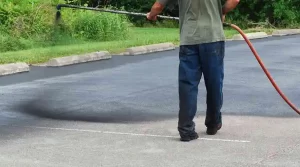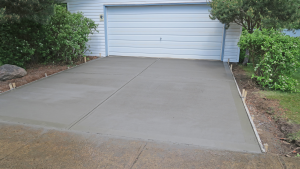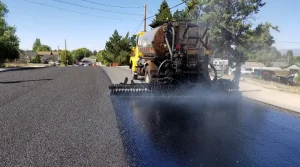Spring is almost here, and with it comes the opportunity to address the asphalt damage caused by winter’s harsh conditions. Sealing your asphalt surfaces in spring helps protect them from both winter and summer damage, ensuring longevity and curb appeal.
Key Takeaways:
- Spring is the ideal time to seal coat your asphalt, providing protection and enhancing durability.
- Sealing in spring helps repair winter damage and prevents further deterioration due to summer heat and sun exposure.
- Sealcoating offers improved resilience, tensile strength, and curb appeal.
- Spring sealing ensures faster curing, resulting in more effective protection for your surfaces.
Why Spring is the Best Time for Sealcoating Asphalt
As the cold weather finally gives way to warmer temperatures, many homeowners and business owners begin to assess the state of their outdoor areas. For asphalt surfaces, the transition from winter to spring is the perfect opportunity to address any damage that may have occurred during the colder months. Sealcoating is one of the most effective ways to repair and protect asphalt driveways, parking lots, roads, and other paved surfaces. If you’re wondering whether it’s time to seal coat your asphalt, here are some compelling reasons why spring is the best season to act.
Repair Winter Damage While Preparing for Summer
Winter is often the most challenging season for asphalt. The freeze-thaw cycle, combined with snow, ice, and deicing agents, can cause significant damage. Water can seep into tiny cracks, and when temperatures drop, the water freezes and expands, worsening the cracks. In spring, as the snow melts and temperatures rise, you can take advantage of this window to assess and repair any winter damage before it worsens.
But winter isn’t the only culprit—summer presents its challenges for asphalt. Prolonged sun exposure and extreme heat can cause cracking, fading, and other forms of damage to unsealed surfaces. Sealcoating in spring gives you a head start, providing protection against both winter’s ravages and the harsh summer sun.
Enhanced Curing and Better Results
While fall and winter are less than ideal for seal coating, the late spring weather offers perfect conditions for the process. Sealers require warmth to cure effectively, and the temperature and weather patterns in spring create an optimal environment for quicker curing times and more effective bonding. When the surface is sealed correctly, you can expect longer-lasting results with a stronger, more durable finish. The spring air helps the sealant adhere more effectively to the asphalt, creating a protective layer that resists both water penetration and UV damage.
Boost Curb Appeal
Over the winter, your asphalt surfaces may have suffered visible wear and tear. Melting snow often reveals corrosion, cracks, potholes, and fading—issues that are not only unsightly but can also reduce the safety of your surfaces. A properly sealed asphalt surface will look much more inviting and well-maintained.
Sealcoating is also an excellent way to address minor cracks and pits in your asphalt. By sealing them, you prevent water from seeping into the cracks, which could lead to further deterioration. It also helps fill in minor depressions, providing a smooth surface that improves drainage and prevents puddles from forming.
Beyond just fixing the damage, seal coating enhances the aesthetic appeal of your asphalt surfaces. It restores that deep, rich black appearance, giving your driveway, parking lot, or roadway a clean, professional look that adds value to your property.
Prevention of Further Damage
By seal coating in spring, you’re not just repairing existing damage—you’re also preventing future issues. The protective layer of the sealant helps prevent damage caused by UV rays, water, oil, and chemicals. A good seal coat acts as a shield, protecting your asphalt from cracking, fading, and softening over time. Regular seal coating, applied every two to three years, can extend the life of your asphalt by several years, saving you money in the long run by reducing the need for costly repairs or replacement.
Increased Property Value
First impressions matter, and your asphalt surfaces are a key part of the overall appearance of your property. Whether it’s a commercial parking lot or a residential driveway, well-maintained asphalt contributes to your property’s curb appeal. Sealcoating is an affordable way to ensure that your surfaces look their best and maintain their functionality for years to come. Plus, potential buyers or customers will take notice of your commitment to keeping your property, which could positively impact property values and attract new business.
Frequently Asked Questions (FAQ)
Q: How often should I seal coat my asphalt?
A: On average, asphalt should be seal coated every two to three years, depending on wear and tear. However, if your asphalt is subjected to harsh weather conditions or heavy traffic, more frequent seal coating may be necessary.
Q: Can I seal coat my asphalt myself?
A: While it’s possible to DIY seal coating, it’s recommended to hire professionals for the best results. Professionals have the necessary equipment and expertise to ensure a uniform and practical application. Improperly applied sealant can lead to uneven coverage or reduced durability.
Q: How long does it take for the seal coating to dry?
A: Typically, seal coating can take anywhere from 4 to 6 hours to dry, depending on weather conditions. Complete curing may take up to 24-48 hours, so it’s essential to avoid heavy traffic on the sealed surface during this time.
Q: Will seal coating fix cracks and potholes?
A: Sealcoating can address minor cracks and surface imperfections, but deeper cracks and large potholes need to be repaired separately before applying sealant. It’s important to fill and level these issues before seal coating to ensure optimal results.
Q: What are the benefits of seal coating over resurfacing or repaving? A: Sealcoating is a cost-effective way to extend the life of your asphalt and protect it from further damage. It’s ideal for surfaces with minor issues, while resurfacing or repaving may be necessary for more severe damage. Sealcoating acts as a preventive measure, helping to maintain your asphalt and delay the need for more extensive repairs.
Conclusion
Sealcoating is a simple yet effective way to protect your asphalt surfaces from the elements, enhance their appearance, and extend their lifespan. Spring is the optimal time for seal coating, providing the ideal conditions for curing and offering protection against both winter and summer damage. If you’re ready to give your asphalt surfaces the care they deserve, contact a trusted asphalt repair provider like Jersey City Paving. With years of experience and a reputation for high-quality service, we’re ready to help your surfaces look and perform their best. Call today for prompt and affordable seal coating services!







